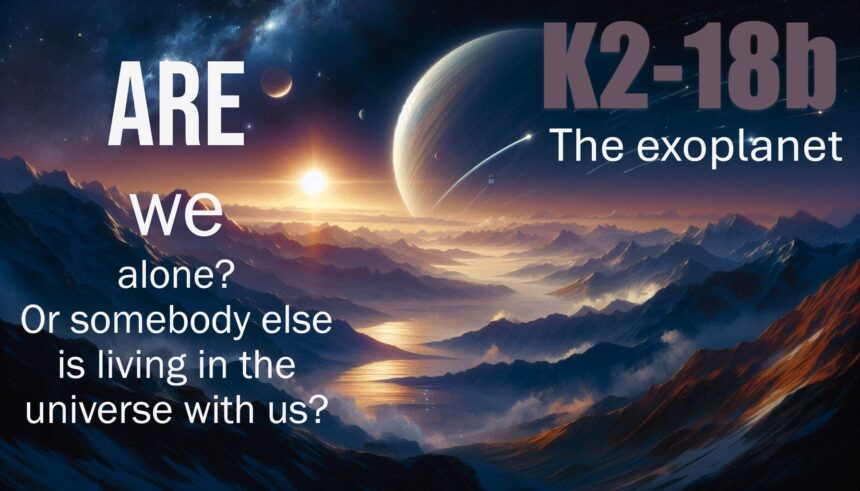Introduction: A Celestial Discovery Rooted in Wonder
K2-18b, the newly discovered exoplanet that may harbor life, has reignited humanity’s timeless question: Are we alone in the universe? This remarkable discovery, made possible by the James Webb Space Telescope, has not only fascinated scientists but also stirred the hearts of believers and thinkers alike. Could this distant planet, located 124 light-years from Earth in the constellation Leo, challenge our understanding of creation, purpose, and even redemption?
As we reflect on this cosmic revelation, it’s essential to merge our knowledge of the universe with the timeless truths of Scripture. For centuries, the Bible has spoken of God’s vast creation. Now, with K2-18b on our radar, both science and faith converge in a profound dialogue.
What Makes K2-18b Unique Among Exoplanets?
K2-18b stands out due to its potential for supporting life. Unlike most exoplanets, it orbits within the habitable zone of its star. Scientists have detected water vapor in its atmosphere and possibly biosignature gases such as dimethyl sulfide (DMS)—a compound associated with biological life on Earth.
Furthermore, its classification as a “Hycean planet” (a world with a hydrogen-rich atmosphere and oceans) gives hope to astrobiologists searching for life beyond Earth. These traits place K2-18b in a rare category that supports the conditions necessary for life as we understand it.
Life Beyond Earth? A Biblical Perspective on Creation
“The Heavens Declare the Glory of God” (Psalm 19:1)
Scripture repeatedly emphasizes the vastness and purpose of creation. Psalm 19:1 declares, “The heavens declare the glory of God; the skies proclaim the work of his hands.” The discovery of K2-18b further supports the idea that God’s creation extends beyond what we once imagined.
Does the Bible Support the Idea of Life on Other Planets?
While the Bible does not explicitly mention extraterrestrial life, it does speak of God creating “the heavens and the earth” (Genesis 1:1). In Job 38, God asks Job, “Where were you when I laid the earth’s foundation?” highlighting the mystery and grandeur of divine creation. Could God have created life elsewhere, as He did on Earth? It is certainly within His power.
What Christian Theologians Say About Cosmic Life
Christian thinkers like C.S. Lewis have speculated about the possibility of other worlds and life beyond Earth. In his science fiction trilogy, Lewis explored themes of redemption and creation in other planets, always rooted in Christian theology.
Author Billy Graham once stated, “I firmly believe there are intelligent beings like us far away in space who worship God. But we have no direct biblical support—only that God is the Creator of the universe.”
This theological openness invites believers to consider the implications of K2-18b’s discovery without fear or contradiction.
Jesus Christ and the Centrality of Earth
The Incarnation: Unique or Universal?
One theological question arises: If there is life on K2-18b, does the redemptive work of Jesus Christ apply to them? The Bible says Jesus came to save humankind (John 3:16). However, Colossians 1:16–17 reveals that “in Him all things were created… and in Him all things hold together.”
Could Christ’s sacrifice have universal significance beyond Earth? This remains a mystery, but it reinforces the cosmic scope of Christ’s authority and love.
The Book of Revelation and Cosmic Imagery
Revelation often uses cosmic language to describe spiritual events. Revelation 21 speaks of “a new heaven and a new earth.” Could this celestial renewal include planets like K2-18b?
Moreover, Revelation 4:11 reminds us: “You are worthy, our Lord and God, to receive glory and honor and power, for you created all things.” The language of “all things” does not limit God’s glory to Earth alone.
Scientific Method and the Spiritual Quest
The pursuit of life on K2-18b reflects humanity’s quest to understand our place in the cosmos. Just as the wise men followed a star to find Christ (Matthew 2), modern scientists follow light through telescopes to discover new truths.
Romans 1:20 reminds us: “For since the creation of the world God’s invisible qualities—his eternal power and divine nature—have been clearly seen, being understood from what has been made.”
God’s Sovereignty Over All Creation
Whether or not life exists on K2-18b, one truth remains: God is sovereign over all. Isaiah 45:12 says, “It is I who made the earth and created mankind on it. My own hands stretched out the heavens; I marshaled their starry hosts.”
The vastness of the cosmos is not beyond His reach. K2-18b may reveal more about our Creator’s creativity and grandeur, not limit it.
Conclusion: Faith and Science Hand in Hand
K2-18b, the newly discovered exoplanet that may harbor life, invites us to wonder—not just about science, but about God. It doesn’t conflict with faith. Instead, it expands it. Whether K2-18b reveals microbial life or remains uninhabited, the discovery underscores the richness of God’s creation.
From Genesis to Revelation, the Bible consistently points us to a Creator who delights in complexity, life, and beauty. Science asks “how.” Faith asks “why.” Together, they form a fuller picture of truth.


Leave a Reply
You must be logged in to post a comment.